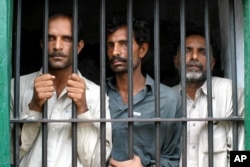She burst into tears as the highest court of the country adjourned the hearing for another date later this month, but her resolve was intact.
“I’ve suffered for 17 years so I’ll keep coming back. I can’t back out now — when the end is near,” said Mukhtar Mai, an illiterate woman from a village in Punjab, Pakistan. She’s been fighting a drawn-out court battle against men in her community who gang raped her in June 2002 on the orders of the village council. She was punished to teach a lesson to her younger brother, whom the council accused of having illicit relations with a woman of a rival clan.
Of the 14 men suspected of being involved in the incident, a lower court sentenced six to death. The rest were released.
The convicts appealed their verdicts and got relief from a higher court. In 2005, five were released and the sixth was given a life sentence instead of death.
Mai appealed against their acquittal in Pakistan’s Supreme Court, which rejected her appeal in 2011.
Eight years later, the court heard her petition on Wednesday to review the earlier decision but adjourned for 20 days to allow the accused time to seek legal counsel. The men had appeared in court without an attorney.
Won't back down
Mai’s case gained worldwide recognition because she refused to bow down to pressure from her community to compromise with the men and to take back her charges.
In addition, she refused to leave her community, despite offers of asylum from other countries. Instead, with the money she received, either from the government or other donors, she opened Mukhtar Mai Women’s Welfare Organization to support and educate Pakistani women.
To compensate for one of the biggest regrets of her life, of being illiterate, she started a school in her area, in which she herself studied until the fifth grade.
Today, the children of several of her alleged rapists go to her school.
“They attend various classes, all the way from first grade to matric [tenth grade],” she said, adding that their parents don’t come to school to check on the kids but send other family members.
No remorse
Still, she felt none of the men ever genuinely felt remorse for their actions.
“In the beginning, they first threatened me, then apologized to make a compromised settlement,” she said. Mai refused.
Back in court Wednesday, Mai was unsure when asked if she was hopeful about the final verdict. “I can’t say anything,” she said.
Mai was named Woman of the Year by the U.S.-based Glamour magazine in 2005 for her courage and tenacity.


